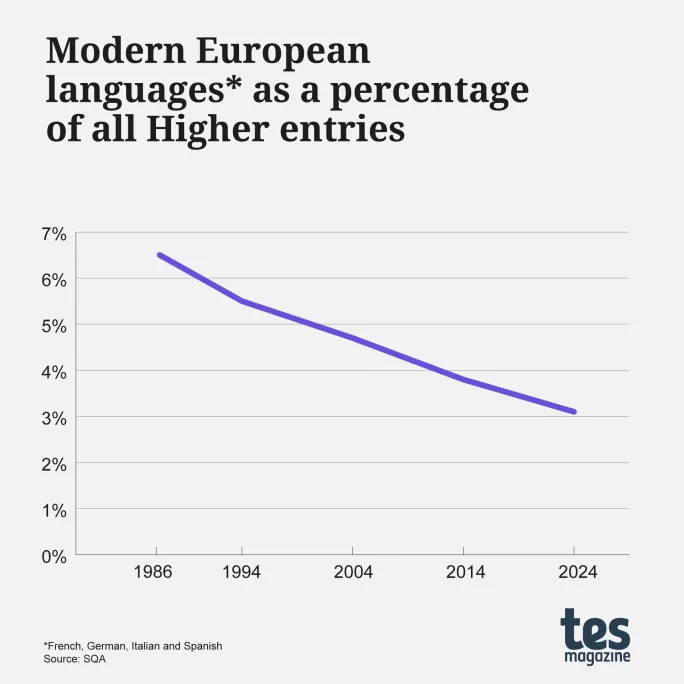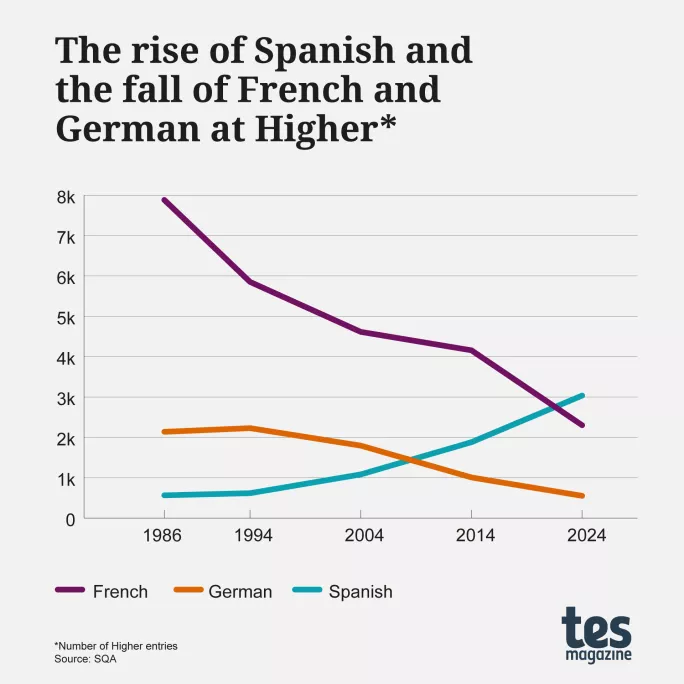Data shows decades-long retreat of languages from Scottish schools

“The reality is that languages examination entries are in sustained decline.”
So said Dr Fiona Barclay, a senior lecturer at the University of Stirling, and Fhiona Mackay, director of SCILT, Scotland’s National Centre for Languages, in an article for Tes Scotland in March.
They pointed to figures showing a decline in the uptake of languages since 2016.
However, interest in languages in Scottish schools appears to have been dropping since way before that.
The decline of languages entries
We looked at 2024 Scottish Qualifications Authority (SQA) data, published last week, to find the number of entries for the four European languages offered at Higher: Spanish, French, German and Italian.
We then worked back through the SQA statistical archive to compare these figures with the number of entries in previous decades, all the way back to the first available year, 1986.
From this starting point in 1986, overall Higher entries for languages have been steadily declining.
In 1986, the four languages made up 6.5 per cent of all Higher entries (10,833 out of 166,403). The figure would have been a little above that if including other languages available at Higher that year and for some time afterwards - including Greek, Hebrew, Norwegian, Portugese, Russian and Swedish - although these typically drew very low numbers.
By 2024, the same four languages only made up 3.1 per cent of all Higher entries (6,075 out of 196,250).

Growth of Spanish
Despite that overall decline, Spanish Higher entries have grown by more than five times over the decades: from 563 in 1986 to 3,035 in 2024. Spanish had more Higher entries than German for the first time in 2009, then overtook French in 2023.
French - for so long the most popular language in Scottish schools - has seen a big decline, from 7,884 in 1986 to less than a third of that, at 2,300 in 2024.
German, meanwhile, seems in such inexorable decline (the 550 entries in 2024 are around a quarter of the 2,137 in 1986) that it is headed for niche status similar to that of Italian in Scottish schools. Italian has long had a small band of champions in schools and its numbers tends to stay at roughly the same level (there were 299 entries in 1986 and 190 in 2024).
Of course, there are other languages offered in Scottish schools in 2024.
Gaelic was available in 1986, when there were a combined 160 Higher entries between courses for “native speakers” and “learners”; in 2024 there was a total of 180 Higher entries across two courses (Gaelic for learners and Gàidhlig).
More recent additions to the SQA range of languages at Higher are Urdu (100 Higher entries in 2024) and Mandarin, which in 2024 had a combined 275 entries between the “traditional” and “simplified” Higher courses. Cantonese, meanwhile, had 35 Higher entries in 2024.
The language that, in percentage terms, has seen the biggest fall over the decades is Latin: the 933 Higher entries in 1986 is nearly six-and-a-half times more than the 145 in 2024.

- Related: Saving Scotland’s ‘languages ecosystem’ from collapse
- Teacher education: Half of places on secondary postgrad teaching courses unfilled
- Curriculum: “Most adults” should be able to speak a foreign language
One attempt to increase the status of languages in Scottish schools in recent times has been the 1+2 languages policy, which aims to give pupils a knowledge of two additional languages by the time they leave primary school. With patchy provision in schools around Scotland, however, the impact of 1+2 is widely seen as underwhelming.
‘Learners prevented from continuing with languages’
Fiona Barclay and Fhiona Mackay, in their piece in March, also pointed to an Erasmus+ study that fed into SCILT’s Generation Global project, which “found learners and parents were being prevented from continuing with languages by the number and availability of subject choices”. They were also concerned by difficulties in recruiting language teachers.
Their overall view of languages in Scottish schools was stark: “The progression pipeline of languages learners is fractured and the ecosystem of languages, moving from young learners through to national exams, university and teacher training, is at risk of collapse.”
They did, however, see some hope in an ongoing curriculum review process in Scotland that “offers a vital opportunity to reposition languages within the curriculum and beyond”.
For the latest Scottish education news, analysis and features delivered directly to your inbox, sign up to Tes magazine’s The Week in Scotland newsletter
Register with Tes and you can read two free articles every month plus you'll have access to our range of award-winning newsletters.
topics in this article



